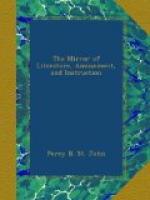Of his feelings on the death of his daughter Allegra, this lady gives the following account:—“On the occasion also of the death of his natural daughter, I saw in his grief the excess of paternal tenderness. His conduct towards this child was always that of a fond father; but no one would have guessed from his expressions that he felt this affection for her. He was dreadfully agitated by the first intelligence of her illness; and when afterwards that of her death arrived, I was obliged to fulfil the melancholy task of communicating it to him. The memory of that frightful moment is stamped indelibly on my mind. For several evenings he had not left his house, I therefore went to him. His first question was relative to the courier he had despatched for tidings of his daughter, and whose delay disquieted him. After a short interval of suspense, with every caution which my own sorrow suggested, I deprived him of all hope of the child’s recovery. ‘I understand,’ said he,—’it is enough, say no more.’ A mortal paleness spread itself over his face, his strength failed him, and he sunk into a seat. His look was fixed, and the expression such that I began to fear for his reason; he did not shed a tear, and his countenance manifested so hopeless, so profound, so sublime a sorrow, that at the moment he appeared a being of a nature superior to humanity. He remained immovable in the same attitude for an hour, and no consolation which I endeavoured to afford him seemed to reach his ears, far less his heart. But enough of this sad episode, on which I cannot linger, even after the lapse of so many years, without renewing in my own heart the awful wretchedness of that day. He desired to be left alone, and I was obliged to leave him. I found him on the following morning tranquillized, and with an expression of religious resignation on his features. ’She is more fortunate than we are,’ he said; ’besides her position in the world would scarcely have allowed her to be happy. It is God’s will—let us mention it no more.’ And from that day he would never pronounce her name; but became more anxious when he spoke of Ada,—so much so as to disquiet himself when the usual accounts sent him were for a post or two delayed.”
The melancholy death of poor Shelley, which happened, as we have seen, also during this period, seems to have affected Lord Byron’s mind less with grief for the actual loss of his friend than with bitter indignation against those who had, through life, so grossly misrepresented him; and never certainly was there an instance where the supposed absence of all religion in an individual was assumed so eagerly as an excuse for the entire absence of truth and charity in judging him. Though never personally acquainted with Mr. Shelley, I can join freely with those who most loved him in admiring the various excellencies of his heart and genius, and lamenting the too early doom that robbed us of the mature fruits of both. His short life had been, like his poetry, a sort of




